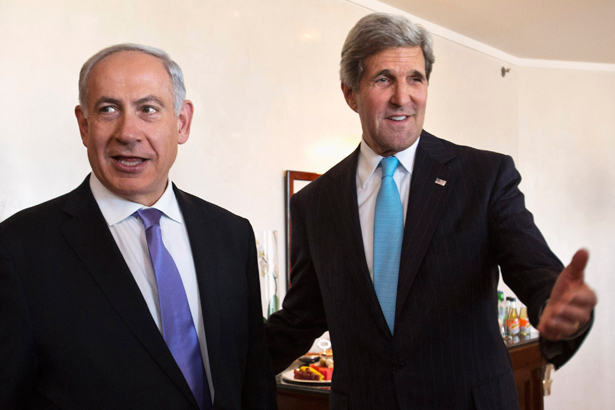
US Secretary of State John Kerry (r) gestures as he meets Israeli Prime Minister Benjamin Netanyahu in Jerusalem June 28, 2013 (Reuters/Jacquelyn Martin)
Secretary of State John Kerry’s valiant exertions to renew Israeli-Palestinian peace talks are bound to fail—for precisely the same reason previous efforts have failed: Prime Minister Benjamin Netanyahu and Israel’s political establishment value territory above peace, or believe they need not choose between the two because they can have both.
And so far, they have been proven right.
The reason they hold this belief is because despite the many diplomatic initiatives the United States has launched over the years to persuade Israeli governments they should not continue to defy international law and opinion by denying Palestinians both the right to independent statehood and the right to equal citizenship in a Greater Israel, Washington never mustered the courage to do the one thing that would have worked: inform Israeli governments that such continued behavior would have consequences, beginning with America’s inability to defend Israel’s annexationist policies in the United Nations and in international courts.
Not only have we not done that, we have done the exact opposite—going to great lengths in assuring Israeli governments and the Israeli public that we would continue to defend them no matter what they do. When President Obama dispatched Vice President Joseph Biden to Israel in March 2010 to register with Netanyahu and his government his administration’s opposition to its violations of a settlement freeze that Netanyahu had agreed to, and Israeli officials used the occasion to humiliate the vice president and the man who sent him by announcing publicly further violations of the freeze, Biden assured Netanyahu that the Israeli-US relationship would remain so solid that “no daylight, no daylight” (no, this not a typo; he said it twice) would come between them.
The president repeated his assurances of the “unbreakable” nature of the US alliance with Israel in his speech to the UN General Assembly in September 2011 and again in his speech to AIPAC of March 2012, and yet again during his recent trip to Israel. And in a particularly effective recent speech by Secretary Kerry before an American Jewish audience, warning that the course Israel’s government is on now will lead to apartheid and to the delegitimization of the Jewish state, Kerry concluded with the assurance that despite differences, “we will always have Israel’s back.”
One might have thought that an Israeli version of apartheid would be seen by the United States as radically inconsistent with the “shared values” regularly invoked as the foundation of and justification for the unprecedented closeness between the two countries. Apparently that is not the case.
The assurance that we will always come to Israel’s defense, irrespective of whether or not we find its behavior objectionable or even against America’s interests, in effect serves as an American guarantee to Netanyahu’s government that no Palestinian state will emerge from renewed peace talks.
Popular
"swipe left below to view more authors"Swipe →
To this day, US policymakers take comfort in the commitment to Palestinian statehood that Netanyahu made in his Bar Ilan speech of June 2009. But even 6-year-olds in Israel did not need to be told what Tzipi Hotovely, a leading Likud Knesset Member, recently declared—that “Netanyahu’s two-state solution speech was tactical, intended for the world. He has no intention of carrying it out.”No one in Israel thought otherwise.
Yet spending time in Israel, as I have been doing, one can’t help hearing from the most unlikely sources—like longtime peace activists—that Netanyahu seems to have softened his opposition to a two-state outcome. A recent New York Times editorial cited a Haaretz report that “Mr. Netanyahu has ‘shifted’ and is now serious about the peace process and a two-state solution.”
Would that this were true, and not an illusion born of desperation. What seems to have eluded these optimists is Netanyahu’s bitter opposition to beginning territorial talks with Palestinians at the pre-1967 border. This opposition is not a tactical ploy for an Israeli advantage in resumed negotiations with Mahmoud Abbas. It is in defense of what Netanyahu considers to be a strategic principle—that the West Bank is not occupied territory but “disputed” territory, to which Israel has as much a claim as Palestinians.
Netanyahu’s uncompromising adherence to this principle was evidenced by his recent appointment of the so-called Levy Commission to determine the status of the West Bank. His choice of chair and members of this commission assured the commission’s conclusion—that Israel’s military subjugation of the West Bank is not an occupation, notwithstanding the unanimous decision of the International Court of Justice to the contrary in July 2004.
Similarly, the effrontery of Netanyahu’s demand that President Obama omit from a speech on US Middle East policy at the State Department on May 19, 2011, any reference to the 1967 border as a starting point for territorial negotiations can only be understood in terms of his determination to assert the primacy of Israel’s claim to all of the historic Land of Israel.
President Obama did not yield to Netanyahu’s demand in 2011. That Netanyahu renewed that demand by rejecting terms of reference, proposed by Secretary Kerry, for resumed peace talks that provide they begin at the pre-1967 lines—and that this time the United States accommodated him by offering to make that statement about the 1967 lines as an American understanding, thus leaving Netanyahu off the hook—tells us all we need to know about prospects for an alleged “shift” in Netanyahu’s views or about prospects for the outcome of Kerry’s efforts to save the two-state solution.
An American “understanding” that would have been followed by an American initiative in the UN Security Council affirming the pre-1967 lines as the starting point for equal territorial exchanges with the Palestinians would have been a game changer.America’s refusal to make such a commitment is a declaration of failure before the proposed talks even begin.
Sharif Abdel Kouddous reports on violence in post-Morsi Egypt.


